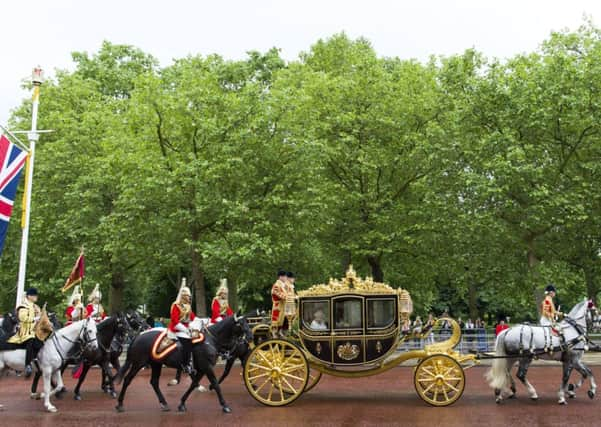Defending Union at heart of Queen’s Speech


In the last Queen’s Speech before the general election, the drive to retain the Union was at the heart of the UK government’s legislative programme. “My government will continue to implement new financial powers for the Scottish Parliament and make the case for Scotland to remain a part of the United Kingdom,” she said.
In measures affecting Scotland, the oil and gas sector was told it would have to pay for a new regulator, while an overhaul of pensions and a massive new childcare programme, along with a controversial bill which would let constituents recall MPs, were also announced.
Advertisement
Hide AdAdvertisement
Hide AdLiberal Democrat Scottish Secretary Alistair Carmichael has written to party leaders in Holyrood offering to extend the provisions of the bill to the Scottish Parliament following the controversy over former SNP MSP Bill Walker, who eventually stood down after being found guilty of domestic abuse.
Meanwhile, the Queen’s Speech was overshadowed by Downing Street being forced to fend off Labour accusations that David Cameron is presiding over a “zombie government”, after she unveiled a legislative programme for the coming year featuring just 11 new bills.
Mr Cameron and Deputy Prime Minister Nick Clegg hailed the programme for the coalition’s final year as “unashamedly pro-work, pro-business and pro-aspiration”.
Heavily trailed reforms abolishing the requirement for pensioners to buy annuities and allowing workers to join Dutch-style collective pension schemes would deliver the biggest transformation in provision for the elderly since the inception of the system, they said.
In a video message, Mr Cameron described the speech as “the next big step in our long-term plan for Britain”.
The Prime Minister said: “These past four years together, we have taken some difficult decisions and endured some testing times, but our plans are working. This Queen’s Speech builds on all the progress we have made. Of course there is a long way to go, but today we are taking one further step forward in turning our country around.”
Labour MPs pointed out that the speech contained no new measures on the NHS or immigration, and leader Ed Miliband said it failed to live up to the challenges Britain faces.
Warning that last month’s local and European elections showed “the depths of discontent with the direction of our country”, Mr Miliband said: “We would have a Queen’s Speech with legislation which would make work pay, reform our banks, freeze energy bills and build homes again in Britain.
Advertisement
Hide AdAdvertisement
Hide Ad“A Queen’s Speech which signals a new direction for Britain, not one which offers more of the same.”
The list of bills announced by the Queen in one of the briefest speeches of modern times – lasting a little under 10 minutes – was shorter than in any other year of the past two decades.
The SNP said the Queen’s Speech highlighted why Scots need to vote Yes on 18 September in the independence referendum. Angus Robertson, SNP Westminster leader, said there was nothing in it on new powers for Holyrood, even though all the pro-UK parties have promised to extend devolution.
He said: “The absence of any mention at all of the Westminster parties’ plans for Scotland in the Queen’s Speech is extraordinary.” He added: “In this – the year of the biggest opportunity in Scotland’s history – Scotland hardly even gets a nod at Westminster, and not a single mention of future plans for improving government in Scotland.”
But Mr Carmichael described the Queen’s Speech as “substantial” and said there was an opportunity for Holyrood to allow for MSPs to be forced to stand for election again with potential amendments to the Recall Bill.
He insisted the measures on the new oil and gas regulator “were what the industry themselves asked for” from a review carried out by Sir Ian Wood. But Oil & Gas UK CEO Malcolm Webb said: “We must disagree with the government seeking to absolve itself from all financial involvement or responsibility for the new regulator.”
TUC general secretary Frances O’Grady said: “This is not a Queen’s Speech for people at work. It is missing anything that will allow them to share in the recovery with a proper wage increase.”
But Simon Walker, director general of the Institute of Directors, said: “The overall message appears to be one of growth, innovation and help for people who want to start a business.”